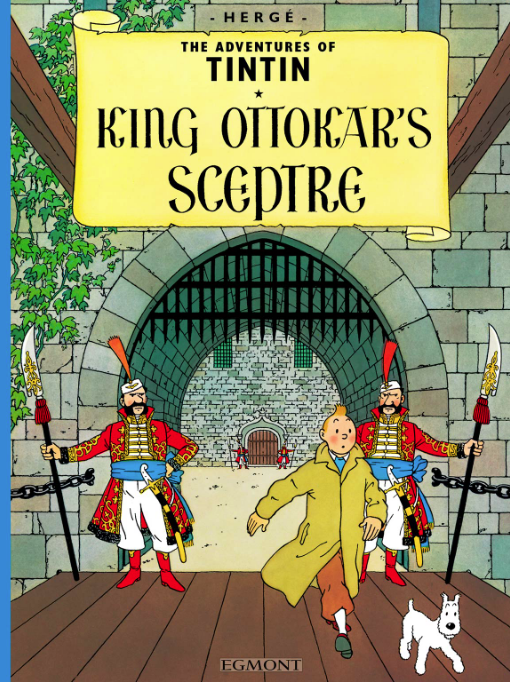Bravely topical at the time, now just beautiful period-piece fun.


A classic Tintin adventure that finds our earnest hero travelling to Syldavia for the first time (he returns in Hergé’s lunar themed double bill), in the company of the mysterious Professor Alembick, sigillographer. Embroiled in tense cross-border politics, court intrigues, and a general ripping good yarn, our doughty young reporter and his faithful canine sidekick Snowy escape numerous jams on their quest for good wholesome adventurous fun.
Whilst the artwork was, as noted by other reviewers elsewhere – I originally posted an earlier version of this review on Amazon’s UK website – reworked when colourised postwar, nonetheless Hergé’s gift for beautiful crisp drawing and strong clean layout was, by this stage, more or less fully formed. The courtly costumes are great, as are the pseudo-historical ‘tourist guide’ spreads Tintin reads on the plane to Syldavia.
Hergé’s storytelling is also growing stronger; although the episodic cliffhanger moments, suited so well to the original serialised format these were first presented in, may occasionally appear contrived to adults, returning to this material, the joins probably won’t be visible to young readers.
This was an early youthful favourite of mine, so I’ve a partisan soft spot for it, but it is now, like almost all Hergé’s Tintin books, simply a wonderfully innocent period piece. That it manages to remain innocent despite Tintin’s royal(ist) imbroglio, and the political parallels between the Syldavia/Borduria dispute and the dark period of European history just then unfolding (this was originally written and published in the late 1930s) is fascinating.
Hergé certainly appears in a bolder and more favourable light here than he would if you only read Tintin In The Land Of The Soviets, or Tintin In The Congo. Especially when one considers – though we have the benefit of hindsight – the dangers posed by the forces of fascism at this time (just before and during WWII), who might’ve chosen to take potentially fatal offense.
But ultimately, like all the Tintin adventures, this is, first, foremost, and fundamentally, good old-fashioned fun.
